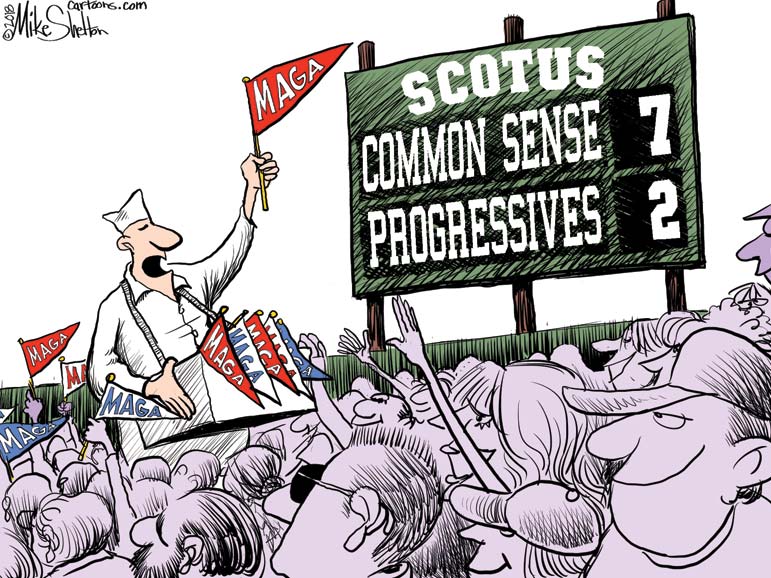
The Supreme Court appears ready to find that an individual state cannot exclude a candidate from the ballot based on the 14th Amendment to the U.S. Constitution.
This month, the Supreme Court heard Donald Trump's appeal from the decision of the Colorado Supreme Court disqualifying him from the ballot for his role in the Jan. 6, 2021 insurrection at the capitol.
The oral argument that lasted more than two hours demonstrated that justices on both the right and left questioned whether it is appropriate for an individual state to make decisions about whether a national candidate should appear on the ballot.
How did Colorado reach the conclusion that Trump should not appear on the 2024 presidential ballot? Section 3 of the 14th Amendment to the U.S. Constitution provides that nobody who has taken an oath to support the Constitution should "hold any office" in the United States if that person has "engaged in insurrection or rebellion against the same, or given aid or comfort to the enemies thereof."
According to the report of the House Select Committee investigating the Jan. 6 Capitol insurrection, "Donald Trump lit that (insurrection) fire."
Special Counsel Jack Smith's indictment alleges, Trump, knowing he lost the 2020 election, "was determined to remain in power." For months after the election, Trump "spread lies that there had been outcome-determinative fraud in the election and that he had actually won." Further, the indictment states, "These claims were false, and the defendant knew they were false," but "repeated and widely disseminated them anyway."
Smith's indictment alleges Trump and his co-conspirators "pushed officials to ignore the popular vote" and "organized fraudulent slates of electors" in Arizona, Georgia, Michigan, Nevada, New Mexico, Pennsylvania and Wisconsin. The indictment accuses Trump and his co-conspirators of using "knowingly false claims of election fraud" in organizing the fraudulent slates of electors, reported CBS News.
Smith has alleged that Trump and his co-conspirators also attempted to enlist then-Vice President Mike Pence to use his role in affirming the electoral vote count on Jan. 6 to "fraudulently alter the election results." Trump also allegedly pressured Pence to fraudulently reject or return Biden's electoral votes.
When that failed, according to the Jan. 6 Committee, Trump tweeted that Vice President Mike Pence "didn't have the courage to do what should have been done to protect our country and our constitution."
The report concluded "virtually everyone on the White House staff" interviewed by the committee condemned Trump's tweet — just as the rioters were attacking the Capitol.
Section 3 of the 14th Amendment was enacted in the aftermath of the Civil War to disqualify individuals from holding office that had served in federal or state government before the war but then supported the Confederacy during the Civil War.
The postbellum amendment provides that no one "shall be a Senator or Representative in Congress, or elector of President and Vice President, or hold any office, civil or military, under the United States, or under any State," if that person "engaged in insurrection or rebellion" against the federal government. The Amendment does not specifically mention the office of president.
That doesn't mean that the 14th Amendment doesn't apply to a modern-day authoritarian insurrectionist.
However, it appears that the decision will be left to the voters and rightfully so. Samuel Moyn, a Yale University law professor, wrote recently in The New York Times, "Keeping Mr. Trump off the ballot could put democracy at more risk rather than less."
Professor Moyn is suggesting that keeping Trump on the ballot is the lesser of two evils. We don't know what impact keeping Trump off the ballot would have on democracy, but Trump has made clear what he has in store for democracy.
Comment by clicking here.
Matthew T. Mangino is of counsel with Luxenberg, Garbett, Kelly & George P.C. His book "The Executioner's Toll, 2010" was released by McFarland Publishing.
Previously:
• 02/27/24: A Parent Convicted for the Conduct of a Child
• 02/09/24: Forensic Evidence: Not What It Used to Be
• 01/22/24: Doing Time Without Committing a Crime


 Contact The Editor
Contact The Editor
 Articles By This Author
Articles By This Author